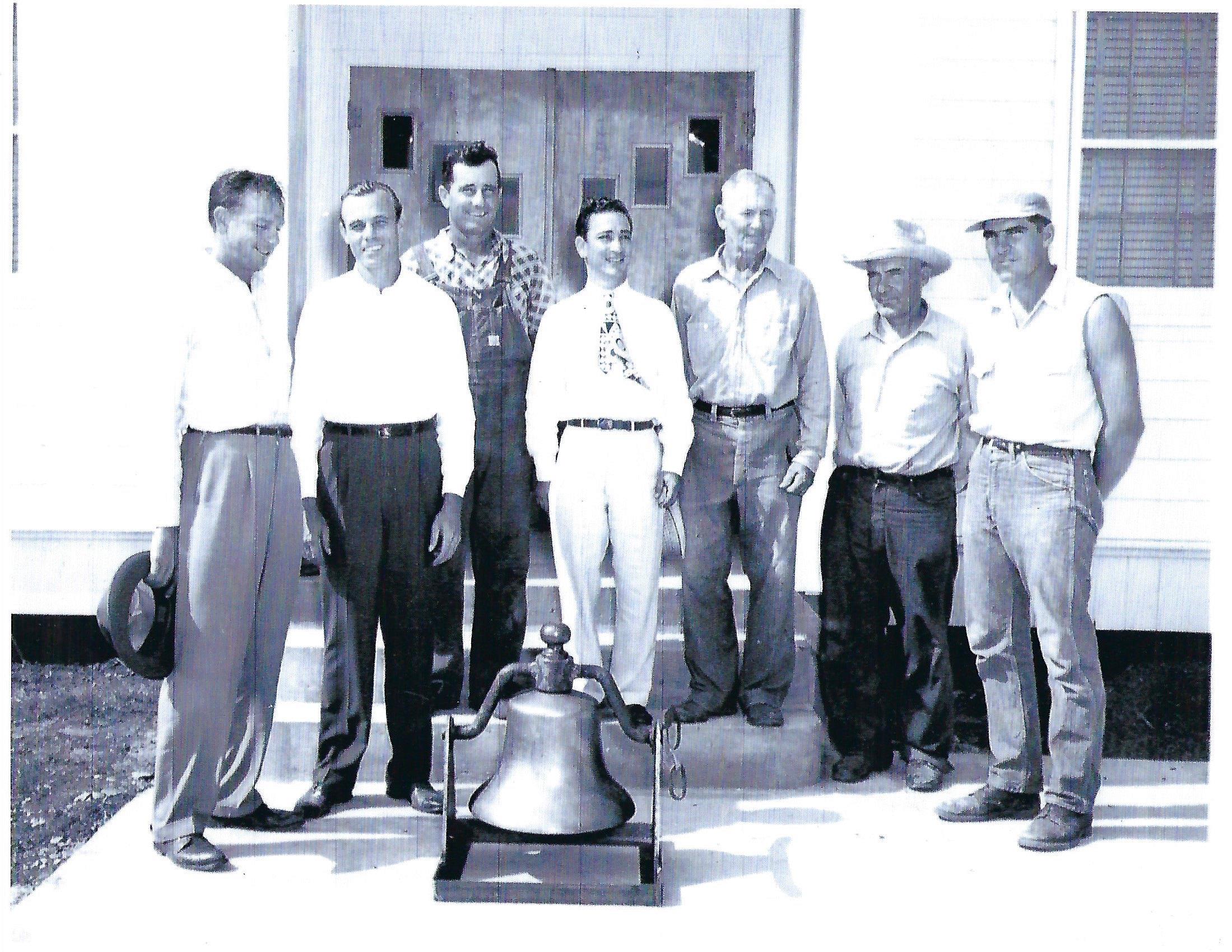|
|
Placedo, TX 10/09/1954. Presentation of Southern Pacific
Locomotive bell to Czech Moravian Brethren Church of Placedo by
Victoria Division Service Club.

ON HAND for the presentation left to right: Service Club Co-Chairmen L.E.
Schaefer and W.D. O'Neil, club and church member M.L. Bravenec, church
President W.E. Tschirhart and other church officers J.L. Elsik, E.H.
Schovajsa and J.M. Schovajsa. As reported at the time, the bell had once
been used as club baseball trophy.
Do good deeds make men worthy?
This is a true story, it's veracity supported by photographic evidence.
On October 9, 1954, the Victoria Division Service Club presented this
bell to the Czech Moravian Brethren Church of Placedo (later known as the
Placedo Brethren Church), and the benefit of that gift lives on. Since 1954,
the bell regularly issued resounding calls to worship in Placedo. Today, 65 years
later, the blessing of the bell continues its clarion call to worship for Christ
the King Lutheran Church of Mission Valley. The bell provided great,
enduring benefit. How might the impact of such a gift be measured? Might the
benefacters reasonably expect an act of such obvious goodness and great benefit
to so many for so long a time would serve as evidence supporting the benefactor's
admission to Heaven. Who could disagree? The Lutheran Church Missouri Synod disagrees.
All over the world people who believe in genuine or virtual Heaven, Hell and
eternal life, are inclined to believe bad deeds (sins) block entry at Heaven's
gate. Conversely, the same believers hope good deeds (personal righteousness)
support their swift acceptance into Heaven.
The Lutheran Church Missouri Synod rejects both notions in favor of a Biblical
standard that a person is saved (given eternal life in heaven) by Godís grace alone
through faith in Jesus Christ alone.
Life experience teaches that personal righteousness offers no reasonable
cause for hope regarding eternal life as good deeds do not necessarily follow good
intentions. Reasonable hope springs from faith in Jesus Christ. Given the weight of
human frailty, it is no surprise believers might question the strength and power
of personal faith. Scripture describes faith as a dynamic range of responses to trial
and tribulation. The concept of a dynamic faith is illustrated in the parable of the
mustard seed as found in the gospels of Matthew, Mark and Luke. Matthew 13:31Ė32
records the parable as follows:
The kingdom of heaven is like a mustard seed, which a man took and
planted in his field. Though it is the smallest of all seeds,
yet when it grows, it is the largest of garden plants and becomes a
tree, so that the birds come and perch in its branches.
In the presence of proper nurturing and care, Seeds grow into mature plants from
which they originally developed. Faith, like seeds, grows in the presence nurture
and care. Faith is a practiced, learned response to life's troubles. Thus, believers
develop and maintain a sure, steady gait through life's difficult circumstances.
In the life of a Christian, faith is nurtured by intentional, mindful acceptance that
it is Christ's Grace alone that saves humanity. Unpredictable acts of personal
righteousness do not. Such acceptance allows Christians to find peace in life
through the most violent of stormy times.
As pressure to perform is eliminated, Christians' peaceful walk fosters increased
opportunities to observe the needs of other individuals. The resulting freedom
expands opportunities to practice generosity that benefits the whole world. The
influence of the smallest, single act can be evaluated only through the lense of time.